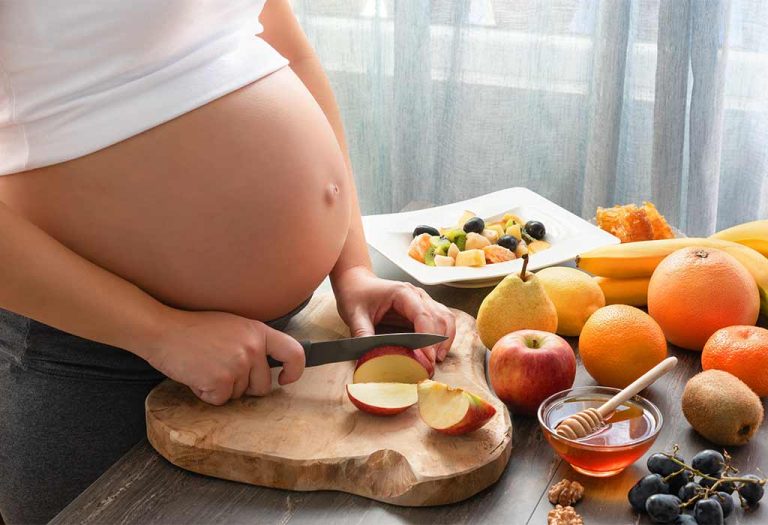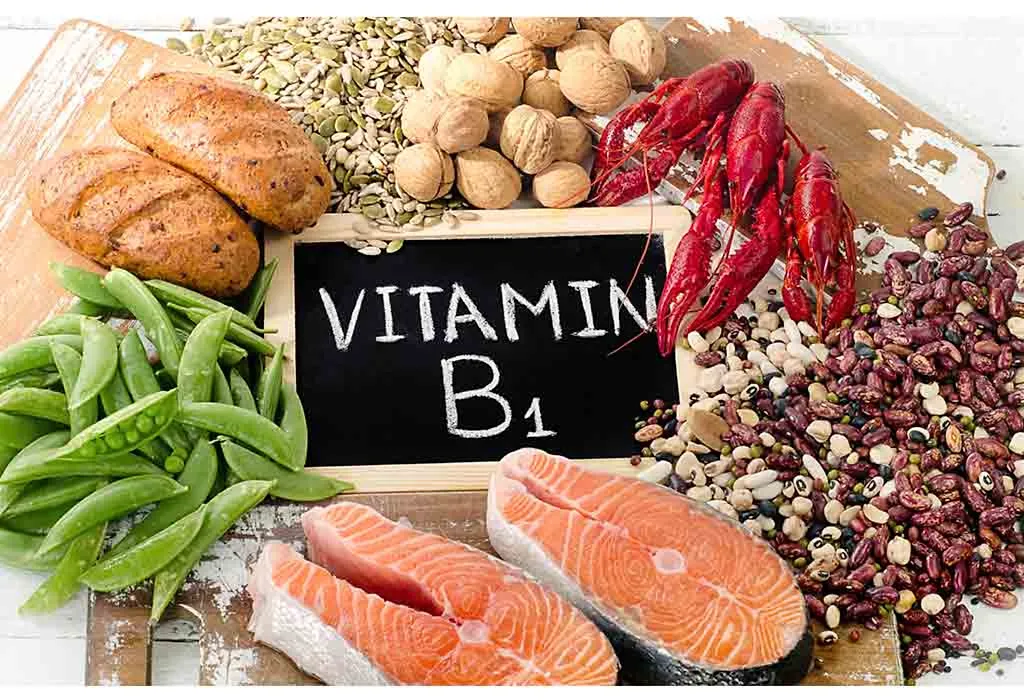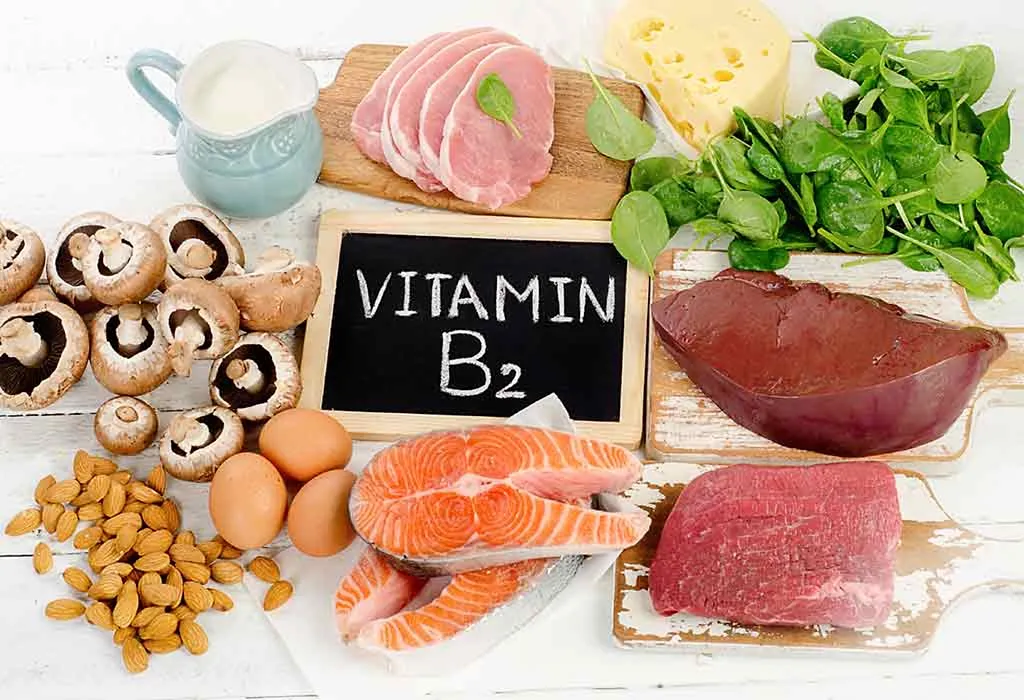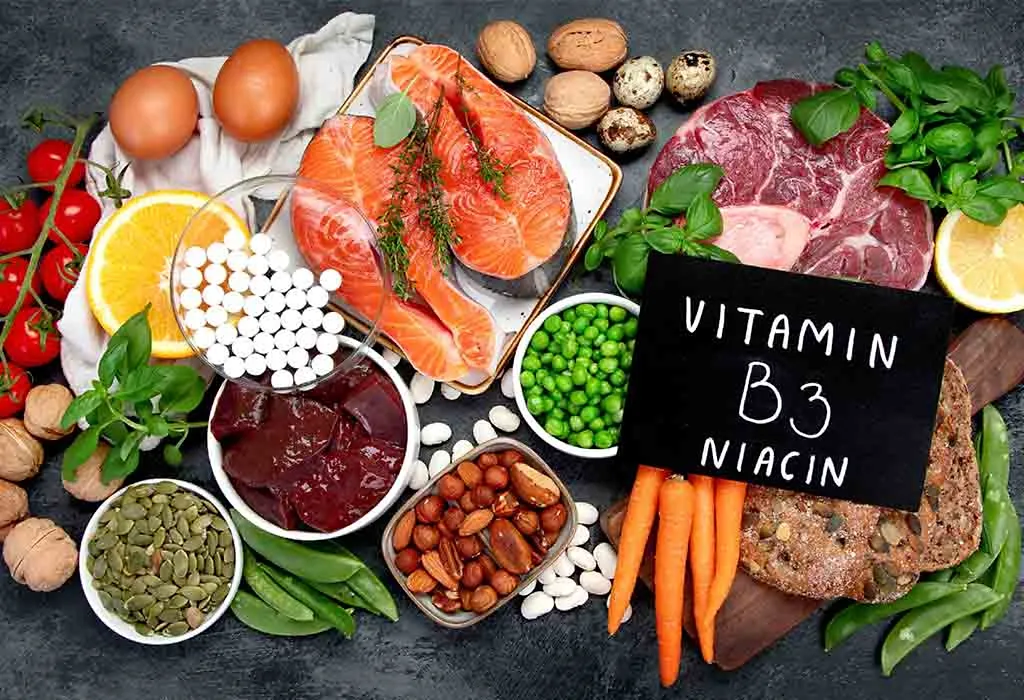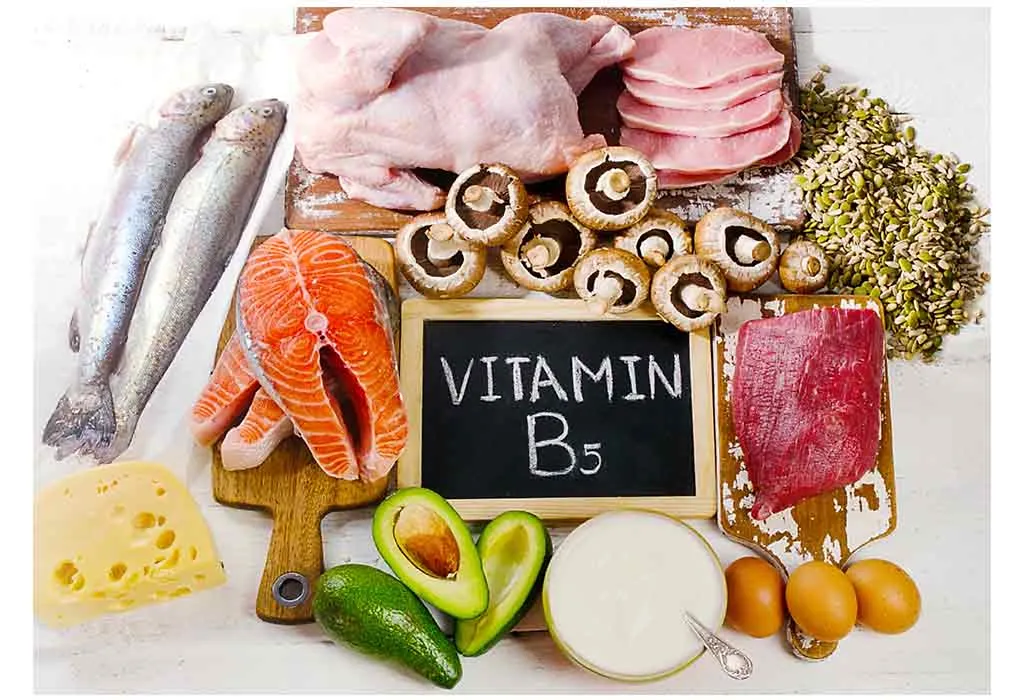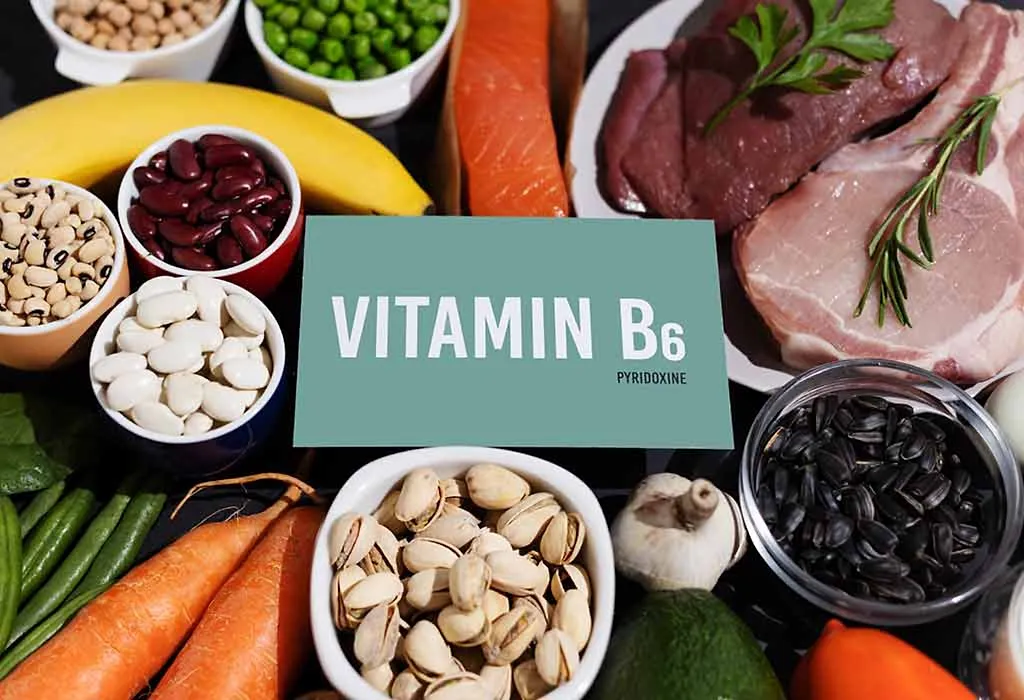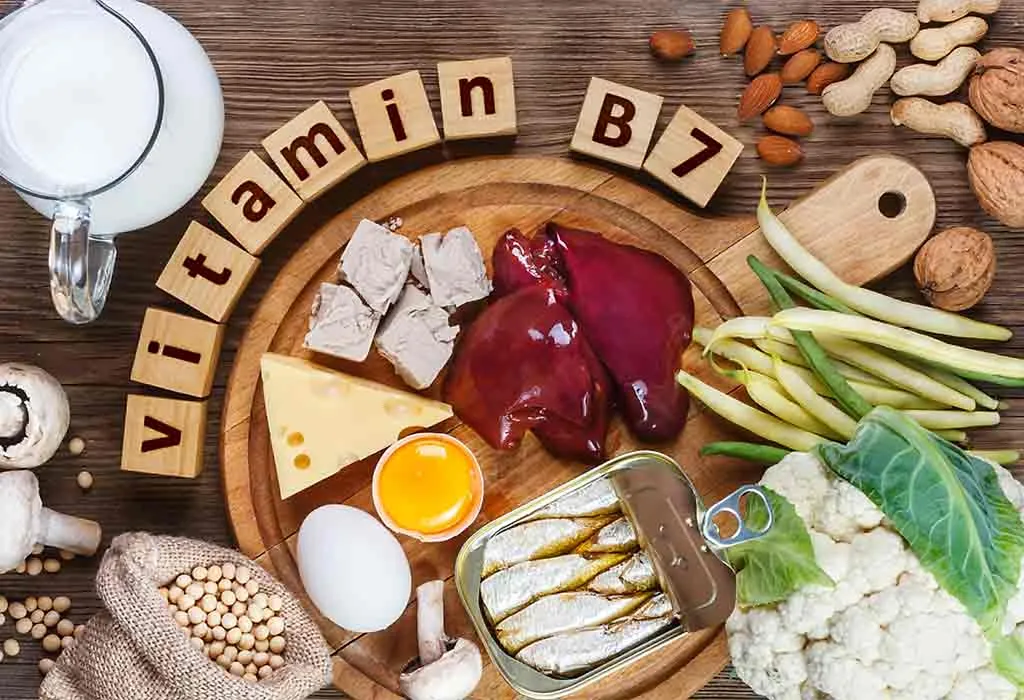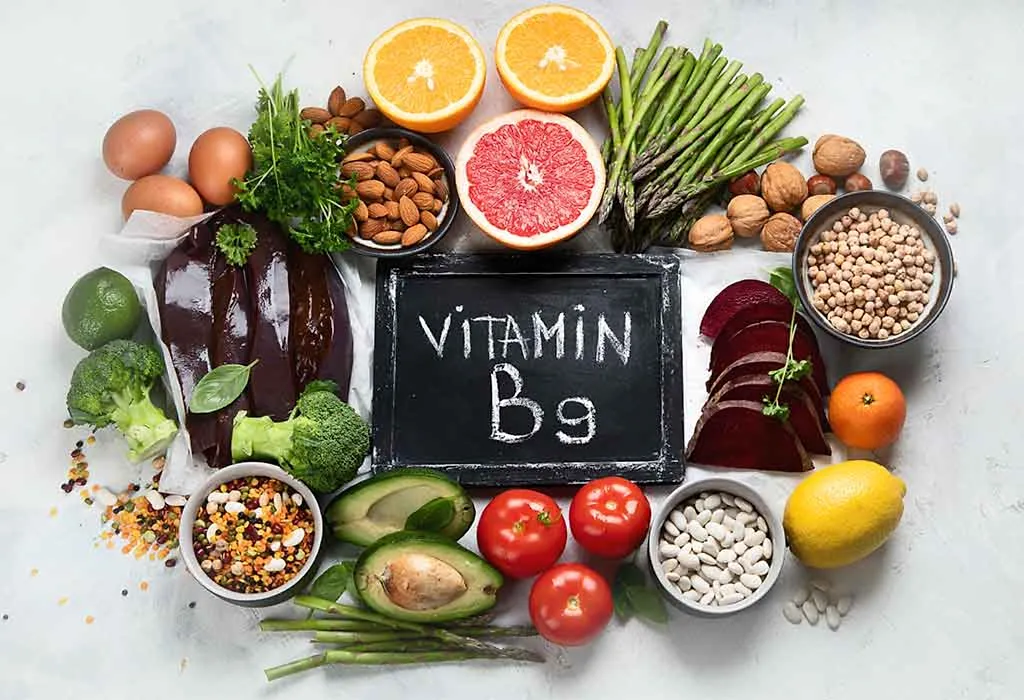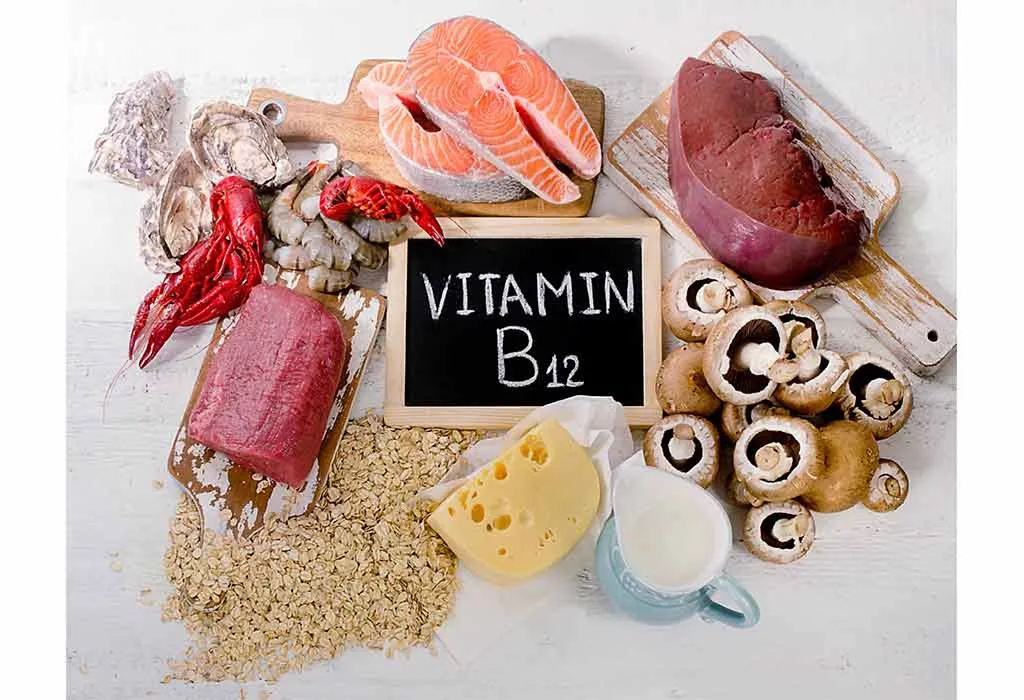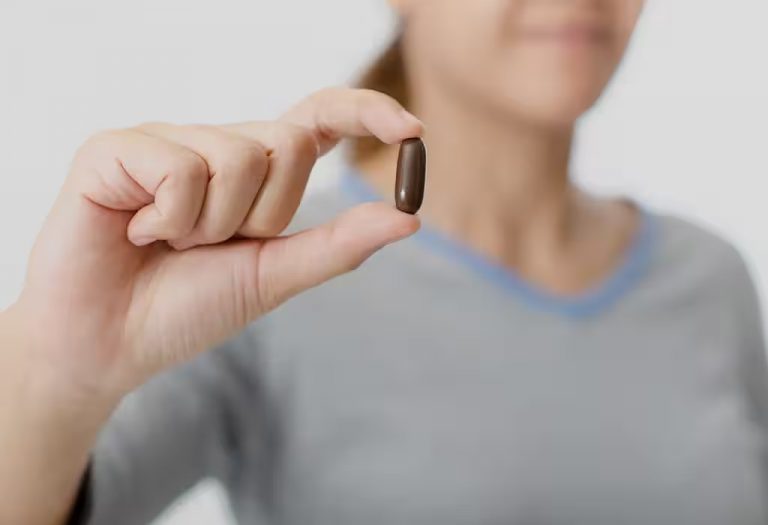B Complex in Pregnancy – Its Importance and Food Sources
The best way to sit fit is by consuming a well-balanced diet that contains all the nutrients in the right amounts. During pregnancy, looking after your nutritional requirements becomes essential as it aids your baby’s healthy development. Many vitamins and minerals constitute a healthy diet, but vitamin B complex in pregnancy stands out exceptionally for its significant health benefit for the mother and growing foetus. From its importance to its dietary sources and its deficiency in a pregnant woman – we will discuss everything in the following post.
B Complex Vitamins During Pregnancy
Vitamin B, also called vitamin B complex, is a set of eight vitamins that come under the vitamin B complex category. Choline, biotin, folate, thiamine, niacin, riboflavin, pyridoxine, pantothenic acid, and cobalamin are in the group of vitamin B complex. These vitamins help convert food into energy and perform other vital functions, including the formation of red blood cells. During pregnancy, this vitamin becomes one of the most important vitamins for an expectant woman to sustain a healthy pregnancy. This is because apart from aiding your unborn baby’s development, B complex is great for pregnancy-related nausea, and it is also beneficial in keeping other side effects of pregnancy, such as fatigue, aches, neurological issues and skin changes, at bay. Vitamin B complex is a water-soluble vitamin, which means our body cannot store it (unlike other fat-soluble vitamins, such as vitamins A, B, C and E, that are stored within the body). Therefore, in order to replenish your vitamin B complex requirements, you will have to consume it daily. We shall discuss all kinds of B complex vitamins in the following sections.
1. Vitamin B1 or Thiamine
Vitamin B1, also known as thiamine, helps perform several important functions.
Why Vitamin B1 Is Important
- It is crucial for the healthy brain development of your unborn baby.
- It helps in the normal functioning of the nervous system, muscles and heart.
- It converts carbohydrates in your food into energy.
Recommended Daily Allowance (RDA)
If you are carrying a single baby, the RDA or recommended, daily allowance of vitamin B1 is approximately 1.4 milligrams per day. However, if you are carrying twins or more babies, you need to increase your daily allowance accordingly.
Dietary Sources
Thiamine is found in abundance in whole grains, dried beans, peas, pasta, pork, and other such food items. Here are some food items and the amount of vitamin B1 in them:
- ½ cup cooked peas – 0.2mg
- ½ cup cooked lentils – 0.2mg
- ½ cup oats – 0.6mg
- 1 cup cooked white rice – 1.2mg
- 1 cup cooked brown rice – 0.2mg
- ½ cup wheat germ – 0.5mg
- ½ cup Brazilian nuts -0.4mg
- ¼ cup pecans -0.4 mg
What If There Is a Vitamin B1 Deficiency
Some of the initial signs that you may experience if you suffer from vitamin B1 deficiency are headache, nerve damage, fatigue, nausea etc. More severe or advanced deficiency may lead to beriberi. Beriberi can lead to problems with blood circulation, nerve degeneration, loss of reflexes etc.
Do You Need a Supplement?
You may get your daily dosage of vitamin B1 by eating a well-balanced diet. However, if you cannot meet your requirements, you may take it in the form of supplements after consulting your doctor.
Side Effects of Excessive Vitamin B1 Consumption
There is no conclusive evidence available that states the side effects of excessive vitamin B1 in your pregnancy diet.
2. Vitamin B2 or Riboflavin
Vitamin B2 (riboflavin) is a co-enzyme that aids many bodily reactions.
Why Vitamin B2 Is Important
This vitamin is essential in keeping health conditions such as preeclampsia at bay. Including this vitamin in your diet gets you a healthy glow, good skin and good eyesight. It is also important for forming the foetal bones, nerves and muscles.
Recommended Daily Allowance (RDA)
On average, your pregnancy diet may contain 1.4 mg of vitamin B2.
Dietary Sources
Wheat flour, milk, and fortified cereals are some of the great food options that contain good amounts of vitamin B2 in it. Following are some food items and the amount of vitamin B2 in them:
- ½ soybeans – 0.3mg
- ½ cup mushroom – 0.2mg
- 1 cup plain low-fat yogurt – 0.5mg
- ½ cup cottage cheese -0.2mg
- ½ cup cooked spinach -0.2mg
- 1 hard-boiled egg -0.3mg
- ¼ cup almonds -0.3mg
What If There Is a Vitamin B2 Deficiency
You may develop dermatitis, anaemia, skin rash and dryness around lips, nose and mouth if you are suffering from vitamin B2 deficiency. In case you are lactose-intolerance or suffering from an eating disorder (anorexia), you are at a higher risk of developing vitamin B2 deficiency-related ailments.
Do You Need a Supplement
If you are consuming meat, eggs, fortified cereals, and dairy products on a daily basis, then you may not need the supplements. However, if your diet lacks such food items, you may include supplements in your diet after consulting your healthcare provider.
Side Effects of Excessive Vitamin B2 Consumption
If you take excessive amounts of this vitamin, it is absorbed by your body and secreted in the form of urine. Also, there is no scientific evidence stating the side effects of its excessive consumption.
3. Vitamin B3 or Niacin
Vitamin B3 (niacin) is helpful in releasing energy from the food we consume. It is found in two forms, nicotinamide and nicotinic acid.
Why Vitamin B3 Is Important
Vitamin B3 is essential for foetal brain development. It helps in easing any digestive issues, migraine and also keeps nausea at bay during pregnancy. Niacin is also effective in keeping the nervous system, mucous membranes and skin healthy during pregnancy.
Recommended Daily Allowance (RDA)
You should ideally consume 18mg of vitamin B3 during pregnancy. This range may extend up to 35mg per day. In other words, you may safely consume anything between 18mg to 35mg of vitamin B3. However, more than 35mg may not be a good idea as there is no study that supports its positive effects.
Dietary Sources
Here are some food items that you may safely include in your diet to pep up your vitamin B3 requirements:
- 4 oz baked or roasted tuna -14mg
- 4 oz turkey – 8.3mg
- 4 oz salmon – 12mg
- 4 oz lightly fried calf’s liver -9.5mg
- 5 oz raw crimini mushrooms -5.5mg
- 4 oz halibut -7.9mg
- 4 oz roasted chicken breast -15mg
What If There Is a Vitamin B3 Deficiency
It is very unlikely that you may suffer from any kind of vitamin B3 deficiency because it is present in abundance in various food items. If your staple diet includes sorghum or corn, you may fall under the category of people with vitamin B3 deficiency.
Do You Need a Supplement
In most cases, the recommended daily dosage of vitamin B3 can be met from your daily diet. Therefore, you may not require vitamin B3 supplements.
Side Effects of Excessive Vitamin B3 Consumption
Excessive amounts of vitamin B3 may cause liver damage or skin flushes. However, there have been no reported side effects of consuming a higher dosage of vitamin B3 during pregnancy. If you were taking any supplements of niacin before getting pregnant, you must bring it to your doctor’s notice as it may fiddle with your cholesterol levels during pregnancy. Also, there have not been enough studies that prove the effects of this supplement on the pregnant woman and her unborn baby; you must consume it with great caution and only after consulting your doctor.
4. Vitamin B5 or Pantothenic Acid
There are many chemical reactions that happen in the cells of our body, and vitamin B5, which is a component of coenzyme A, helps in many such cell functions.
Why Vitamin B5 Is Important
This vitamin helps in releasing various hormones in our body that make us feel less stressed during pregnancy. It aids the metabolism of fats, proteins and carbohydrates. Those pregnant are more prone to muscle cramps during pregnancy, and vitamin B5 helps in keeping muscle cramps at bay.
Recommended Daily Allowance (RDA)
When you are pregnant, your body may require approximately 6mg of pantothenic acid or vitamin B5 on an everyday basis.
Dietary Sources
There are ample food sources that you may safely include in your pregnancy diet to compensate for your daily vitamin B5 requirement. Here are some of the food items with their vitamin B5 content:
- 1 large hardboiled egg – 0.6mg
- ½ cup boiled broccoli – 0.4mg
- ½ cup boiled cauliflower -0.3mg
- 1 medium-sized banana – 0.4mg
- 1 medium-sized orange – 0.5mg
- ½ raw mushrooms – 0.4mg
- 1 cup cooked oatmeal – 0.4mg
- 1 medium-sized potato – 0.6mg
- 1 cup non-fat milk – 1mg
- ½ cup cooked yellow corn kernels – 0.6mg
- ½ medium-sized avocado -1.3mg
- 1 medium-sized baked sweet potato – 1.2mg
- 5 ounces raw crimini mushrooms – 2mg
- 7 ounces plain low-fat yogurt – 1.2mg
- ¾ cup fortified whole grain cereal – 11mg
- ¼ cup roasted sunflower seeds – 2.4mg
What If There Is a Vitamin B5 Deficiency
You should not worry about any kind of deficiency because you may make up for the required amounts of this vitamin from your daily diet. However, if you are suffering from toxaemia, you are dieting, or you are malnourished during pregnancy, you may be at risk of developing this deficiency. If you suffer from a deficiency of this vitamin, you may experience fatigue and weakness.
Do You Need a Supplement
Vitamin B5, or pantothenic acid, is present in most of your prenatal vitamins, and you can easily get this vitamin from your regular food. Therefore, if you are eating a diet rich in vitamin B5 and taking your prenatal vitamins, you may not require supplements.
Side Effects of Excessive Vitamin B5 Consumption
Vitamin B5 is a water-soluble vitamin. Any excess amounts of this vitamin in your body may get expelled through urine. However, ensure you do not consume this vitamin in more than the required amounts.
5. Vitamin B6 or Pyridoxine
To metabolize the proteins, carbohydrates and fats, our body requires pyridoxine or vitamin B6. This vitamin also helps in forming antibodies, red blood cells and neurotransmitters in our body.
Why Vitamin B6 Is Important
Vitamin B6 is essential for a healthy pregnancy because this vitamin helps in regulating your blood sugar levels and also keeps nausea, vomiting and morning sickness at bay. It is also beneficial for the development of the foetal brain and nervous system. Consuming good amounts of this vitamin during pregnancy may lower your risk of delivering low-birth babies.
Recommended Daily Allowance (RDA)
In order to have maximum benefit from this vitamin, you should include approximately 25mg to 50mg of vitamin B6 in your pregnancy diet. However, a non-pregnant woman under 18 years of age may include up to 80mg and over 19 years of age may include up to 100mg of vitamin B6 in her daily diet. However, make sure not to exceed the upper limit of 100mg per day.
Dietary Sources
Vitamin B6 can be easily found in many food items. Here are some food items and the amount of vitamin B6 present in them:
- 3 oz cooked salmon – 0.50mg
- 3 oz broiled lean pork loin – 0.50mg
- 3oz roasted chicken – 0.45mg
- 1 oz roasted sunflower seeds – 0.20mg
- 1 oz roasted hazelnuts – 0.16mg
- 1 cup cooked brown rice – 0.25mg
- ½ avocado – 0.24mg
- 1 medium-sized banana – 0.44mg
- 7 oz prune juice – 0.55mg
- 1 cup cooked spinach – 0.45mg
- 1 baked medium-sized potato with skin – 0.75mg
- ½ cup canned chickpeas – 0.57mg
What If There Is a Vitamin B6 Deficiency
It is very rare to have any severe vitamin B6 deficiencies, but milder deficiencies are common. You may experience mouth ulcers, sores, inflammation of the mouth or tongue and depression as some of the early symptoms of vitamin B6 deficiency. Sometimes the deficiency of this vitamin may affect the immune system, may cause a decrease in antibody production and may cause a type of anaemia.
Do You Need a Supplement?
If you eat a healthy diet that includes all food groups in the right amounts, you may not include any supplements of this vitamin. Also, most of your prenatal vitamins may include ample amounts of this vitamin. However, refrain from overdosage on this vitamin as it may have harmful effects on you and your growing baby.
Side Effects of Excessive Vitamin B6 Consumption
If your pregnancy diet contains a lot of fortified food items, there is a likelihood of excessive intake of this vitamin. Sometimes your prenatal vitamins may also contain high amounts of this vitamin, which may not be good. Excessive amounts of pyridoxines may cause numbness or nerve damage.
6. Vitamin B7 or Biotin
Vitamin B7 is also known as vitamin H or biotin. This vitamin helps in generating energy from the food that you consume. In other words, this vitamin helps generate enzymes that break down the protein, carbohydrates and fats in your food.
Why Vitamin B7 Is Important
If you are experiencing any kind of hair loss, brittle nails or skin rash, vitamin B7 is what can get you to the rescue. Also, this vitamin is vital for foetal growth and development.
Recommended Daily Allowance
You may include approximately 30mg of vitamin B7 in your daily pregnancy diet.
Dietary Sources
Your digestive tract has some good bacteria that help in the production of biotin for your body. Here are some food sources that are considered rich sources of biotin:
- Milk
- Oats
- Raspberry
- Molasses
- Cauliflower
- Cheese
- Pork
- Salmon
- Mushroom
- Swiss chard
- Oats
- Liver
- Egg yolk
What If There Is a Vitamin B7 Deficiency
The level of biotin or vitamin B7 can severely decline because there is a rapid breaking down taking place during pregnancy. It is seen that around one-third of women may develop moderate vitamin B7 deficiency, which may cause congenital problems in the growing foetus. In order to be safe and rule out any such risk, you should make sure that you consume apt amounts of biotin in your diet. Women who suffer from any kind of biotin deficiency may experience depression, hair loss, tingling sensation in the legs or arms, hallucinations etc.
Do You Need a Supplement?
During pregnancy, your doctor may prescribe you multivitamins to cover up for any vitamin or mineral deficiency that you may suffer. Most of these multivitamins contain substantial amounts of vitamin B7 in them to save your unborn baby from any congenital anomalies.
Side Effects of Excessive B7 Consumption
As a pregnant woman, you need healthy levels of biotin levels in your body to sustain a healthy pregnancy. However, any extra amounts of vitamin B7 may prove to be harmful and cause side effects. The excess amounts of biotin may cause acne and allergies or, in some severe cases, may lead to abortion or miscarriage, too. In case of symptoms, you should either stop taking the supplements or get in touch with your doctor. There have been very few cases reported, which means it is a very rare occurrence. You should consult your doctor and get the right dosage prescribed for you.
7. Vitamin B9 or Folic Acid
As discussed above, there are eight vitamins in total when we talk about vitamin B. Out of all the eight vitamins, vitamin B9, which is better known as folic acid, is the most important vitamin for a pregnant woman.
Why Vitamin B9 Is Important
Here are some reasons that explain why a pregnant woman needs vitamin B9:
- It helps in the foetal development, growth of the placenta and the synthesis of DNA.
- It helps to keep anaemia at bay by aiding the production of red blood cells.
- It helps to save the pregnant woman from the conditions such as preeclampsia and also helps in lowering the risk of defects like cleft lip, cleft palate and heart problems in babies.
- Folic acid is essential in preventing serious birth complications such as complications in the spinal cord (spina bifida), brain (anencephaly) and NTD or neural tube defects.
- To minimise the chances of neural tube defects in your baby, you should start taking folic acid before pregnancy and the first trimester of your pregnancy. This may reduce the risk of NTD by almost 70 per cent. Your baby’s neural tube is the part of your unborn baby’s spine, and the brain starts forming.
- Neural tube defects can begin occurring at a fairly early stage in pregnancy, sometimes even before you come to know about your pregnancy. In order to reduce the risk of NTDs in your baby, you may start taking folic acid supplements whenever you start trying to get pregnant.
Recommended Daily Allowance (RDA)
Here’s how you may include vitamin B9:
- Around 400 mcg per day if you are trying to get pregnant.
- Approximately 400 mcg in a day in your first trimester of pregnancy.
- About 600 mcg per day in your second and third trimesters.
A pregnant woman must ensure that she consumes the recommended dosage of vitamin B9 to avoid any complications in her pregnancy. Most prenatal vitamins include up to 1000 mcg of folic acid. You should not take more than 1000 mcg of folic acid in a day. If your doctor feels the requirement, you may be prescribed the additional dosage of folic acid.
Here are some cases when you may be required to take an extra dosage of folic acid:
- If you are carrying twins or multiple babies.
- If your unborn baby has been detected with a neural birth defect, you may be advised to add up to 4000mcg of folic acid per day.
- If you are an obese or overweight woman, you should check with your doctor if you may require an added dosage of folic acid to support a healthy pregnancy.
- If you are on anti-seizure or diabetes medication.
- If you suffer from a genetic condition known as Methylenetetrahydrofolate, which makes it difficult for the body to produce folic acid or folate.
Dietary Sources
Citrus fruits, lentils, dark green leafy vegetables, peas, dried beans, nuts, avocado, asparagus, etc., are some of the food products that contain good amounts of folic acid in them. Here are some food items that have an amount of folic acid in them:
- ½ cup boiled or blanched spinach leaves – 110mcg
- ½ cup boiled Great Northern beans – 89mcg
- ½ cup cooked egg noodles – 115mcg
- ½ cup cooked lentils – 180mcg
- 3 ounces braised and cooked beef liver – 210mcg
- ¾ cup fortified cereals – 400mcg
What If There Is a Vitamin B9 Deficiency
If you suffer from mild folic acid deficiency during pregnancy, it is very much likely that you may not even come to know about it. However, it may affect the initial embryonic development. However, if you suffer from a severe deficiency. In that case, you may notice some very prominent symptoms such as weight loss, diarrhoea, headache, heart palpitations, irritability, weakness, loss of appetite, sore tongue anaemia etc.
Do You Need a Supplement
The amount of folic acid that you may require on an everyday basis may become difficult for you to get from the dietary sources only. Therefore, in order to sustain a healthy pregnancy and childbirth, every pregnant woman should include folic acid supplements. The correct dosage of vitamin B9 can be established after consulting your doctor.
Side Effects of Excessive B9 Consumption
It is very unlikely and rare that you may consume high amounts of folic acid from dietary sources. But you should be careful regarding taking supplements and only take the required dosage of them. If you consume excessive amounts of folate or vitamin 9, it may suppress the symptoms of vitamin B12 deficiency because both these vitamins work closely. Also, if you are carrying a female baby, it may increase the chances of the baby developing obesity and diabetes later in her life. According to one study, too much folate consumption by pregnant women increases the risk of autism in babies.
8. Vitamin B12 or Cobalamin
Just like folic acid, vitamin B12 or cobalamin is crucial for a healthy pregnancy, too.
Why Vitamin B12 Is Important
A study reported a good supplementation of vitamin B12 along with folic acid in pregnancy may improve birth weight and length, head circumference and chest circumference of the foetus. Here are important functions that vitamin B12 plays in a pregnant woman’s body:
- It helps in neural tube formation and foetal brain development.
- It helps in improving your energy levels, mood and stress levels by metabolizing proteins, carbohydrates and fats.
- It helps in the development and functioning of the brain, nerves and blood cells.
- It is beneficial for synthesizing myelin and fatty acids that are required for the proper functioning of the central nervous system and neurological functions.
Recommended Daily Allowance (RDA)
The recommended daily dosage of vitamin B12 is 2.6mcg, in case you are a pregnant woman. It has been proved that if vitamin B12 is taken along with folic acid, it increases its efficacy.
Dietary Sources
B12 vitamin is usually found in animal foods. Here are some of our recommendations that you can try to get your daily dosage of vitamin B12:
- 4oz broiled lean meat tenderloin – 3mcg
- 4oz roasted lamb loin – 2.5mcg
- 4oz braised calf’s liver – 41mcg
- 4oz halibut – 1.56mcg
- 4oz boiled or steamed shrimps – 1.5mcg
- 4oz broiled or baked scallops – 2mcg
- 4oz broiled or baked salmon – 3.3mcg
- 4oz baked or broiled snapper – 41mcg
If you follow a vegan diet, you may include soy products and soy milk to fulfil your body’s vitamin B12 requirements.
What If There Is a Vitamin B12 Deficiency
It is rare for a pregnant woman to have a vitamin B12 deficiency. Still, if the deficiency occurs, it may lead to serious medical complications in your unborn baby, such as neural birth defects. You may experience fatigue, depression, insomnia, and anxiety.
Do You Need a Supplement
Your prenatal supplements may contain vitamin B12, too. Therefore, you may not require an added dosage of this vitamin. However, if you are deficient, then your doctor may recommend an added dosage of this vitamin.
Side Effects of Excessive B12 Consumption
You may consume vitamin B12 safely during pregnancy because there are no reported adverse effects of excessive consumption of this vitamin during pregnancy. However, in a study, it has been established that if a pregnant woman consumed excessive amounts of vitamin B12, it might cause neurodevelopment conditions, autism spectrum disorder etc.
It is recommended that you discuss the recommended dosage of B complex tablets during pregnancy before you start taking any supplements. Though most pregnant women may require almost the same amounts of B complex during pregnancy, however, if your doctor feels the need, you may be prescribed a higher dosage.
References/Resources:
1. Roles of Vitamin B in Pregnancy; American Pregnancy Association; https://americanpregnancy.org/healthy-pregnancy/pregnancy-health-wellness/vitamin-b-pregnancy/
2. B vitamins and folic acid; NHS; https://www.nhs.uk/conditions/vitamins-and-minerals/vitamin-b/
3. Gadgil. M, Joshi. K, Pandit. A, et al.; Imbalance of folic acid and vitamin B12 is associated with birth outcome: an Indian pregnant women study; Eur J Clin Nutr.; PubMed; https://pubmed.ncbi.nlm.nih.gov/24448492/; June 2014
4. Vitamin B; BetterHealth Channel; https://www.betterhealth.vic.gov.au/health/healthyliving/vitamin-b
5. Vitamin B Complex; Barley (Second Edition), 2014; ScienceDirect; https://www.sciencedirect.com/topics/agricultural-and-biological-sciences/vitamin-b-complex
6. Folic Acid and Pregnancy; KidsHealth; https://kidshealth.org/en/parents/preg-folic-acid.html
7. Women Need 400 micrograms of Folic Acid Every Day; CDC; https://www.cdc.gov/ncbddd/folicacid/features/folic-acid.html
8. Too Much Folate in Pregnant Women Increases Risk for Autism, Study Suggests; Johns Hopkins Bloomberg School of Public Health; https://publichealth.jhu.edu/2016/too-much-folate-in-pregnant-women-increases-risk-for-autism-study-suggests; May 2016
9. B Vitamins; Harvard. T.H. Chan; https://www.hsph.harvard.edu/nutritionsource/vitamins/vitamin-b/
10. Vitamin B12; CDC; https://www.cdc.gov/breastfeeding/breastfeeding-special-circumstances/diet-and-micronutrients/vitamin-b12.html
11. Riboflavin; MedlinePlus; https://medlineplus.gov/druginfo/natural/957.html
12. Vitamin B6; NIH; https://ods.od.nih.gov/factsheets/VitaminB6-HealthProfessional/
13. Thiamin; NCBI; National Academies Press (US); https://www.ncbi.nlm.nih.gov/books/NBK114331/; 1998
Also Read:
Zinc Intake During Pregnancy
Which Herbs Are Safe in Pregnancy?
Consuming Vitamin K in Pregnancy
Was This Article Helpful?
Parenting is a huge responsibility, for you as a caregiver, but also for us as a parenting content platform. We understand that and take our responsibility of creating credible content seriously. FirstCry Parenting articles are written and published only after extensive research using factually sound references to deliver quality content that is accurate, validated by experts, and completely reliable. To understand how we go about creating content that is credible, read our editorial policy here.





